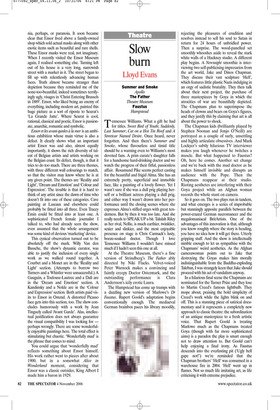Slow burn
Lloyd Evans
Summer and Smoke Apollo The Father Theatre Museum Faustus Hampstead
Tennessee Williams. What a gift he had for titles. Sweet Bird of Youth; Suddenly, Last Summer; Cat on a Hot Tin Roof and A Streetcar Named Desire. Once heard, never forgotten. And then there’s Summer and Smoke, whose flavourless and timid title should be a warning even to Williams’s most devoted fans. A prim curate’s daughter falls for a handsome hard-drinking doctor and we watch the progress of their fitful, passionless affair. Rosamund Pike seems perfect casting for the beautiful and frigid Alma. She has an extremely pretty, superficial and immobile face, like a painting of a lovely flower. Yet I wasn’t sure if she was a dull prig playing herself or a brilliant actress playing a dull prig, and either way I wasn’t drawn into her performance until the closing scenes where she expresses Alma’s stifled urges with great tenderness. But by then it was too late. And she really needs to SPEAK UP a bit. Talulah Riley as her rival, Nellie, is much earthier, twinklier, sexier and slinkier, and the most enjoyable presence on stage is Chris Carmack’s lusty, booze-soaked doctor. Though I love Tennessee Williams I wouldn’t have missed much if I hadn’t seen this one at all.
At the Theatre Museum, there’s a fine version of Strindberg’s The Father ably directed by Niki Flacks. Velvet-voiced Peter Warnock makes a convincing and faintly creepy Doctor Ostermark, and the outstanding performance is Clara Andersson’s icily erotic Laura.
The Hampstead has come up trumps with a dazzling new version of Marlowe’s Dr Faustus. Rupert Goold’s adaptation begins conventionally enough. The mediaeval German brainbox paces his library moodily, rejecting the pleasures of erudition and resolves instead to sell his soul to Satan in return for 24 hours of unbridled power. Then a surprise. The wood-panelled set smoothly whooshes aside to reveal the stark white walls of a Hackney studio. A different play begins. A Newsnight smoothie is interviewing two self-publicising impresarios from the art world, Jake and Dinos Chapman. They discuss their vast sculpture ‘Hell’, which features little plastic Nazis indulging in an orgy of sadistic brutality. They then talk about their next project, the purchase of three masterpieces by Goya in which the atrocities of war are beautifully depicted. The Chapmans plan to superimpose the heads of clowns and bears on Goya’s figures, and they justify this by claiming that art is all about the power to shock.
The Chapman kids (brilliantly played by Stephen Noonan and Jonjo O’Neill) are portrayed as a couple of surly, unsettling and highly articulate obsessives. And Mark Lockyer’s subtly hilarious TV interviewer makes you laugh whenever he twitches a muscle. But what happened to Faustus? Oh, here he comes. Another set change and we’re back with the mad doctor as he makes himself invisible and disrupts an audience with the Pope. Then the Chapmans reappear at their studio. Rioting aesthetes are interfering with their Goya project while an Afghan woman records the whole stunt on camera.
So it goes on. The two plays run in tandem, and what emerges is a series of improbable but stunningly apposite parallels between the power-crazed German necromancer and the megalomaniacal BritArtists. One of the advantages of this innovation is that, although you know roughly where the story is heading, you have no idea how it will get there. Utterly gripping stuff. And the show is intellectually nimble enough to let us sympathise with the Chapmans’ weird aesthetics. As the Afghan camerawoman points out to Jake that destroying the Goyas makes him morally indistinguishable from the Buddha-exploding Taleban, I was strangely keen that Jake should proceed with his act of vandalism anyway.
In a hilarious final scene the Chapmans are nominated for the Turner Prize and they lose to Martin Creed’s famous lightbulb. They mope about, praising the bold simplicity of Creed’s work while the lights blink on and off. This is a stunning piece of satirical documentary and it represents a completely new approach to classic theatre: the subordination of an antique masterpiece to a fresh artistic voice. That Rupert Goold is treating Marlowe much as the Chapmans treated Goya (though with far more sophisticated aims) is a paradox the play is smart enough not to draw attention to. But Goold can’t help enjoying a final irony. As Faustus descends into the everlasting pit (‘Ugly hell gape not!’) we’re reminded that the Chapman brothers’ ‘Hell’ was consumed in a warehouse fire in 2004. ‘Hell’ went up in flames. Not so much life imitating art, as life criticising it with extreme prejudice.


















































































































 Previous page
Previous page